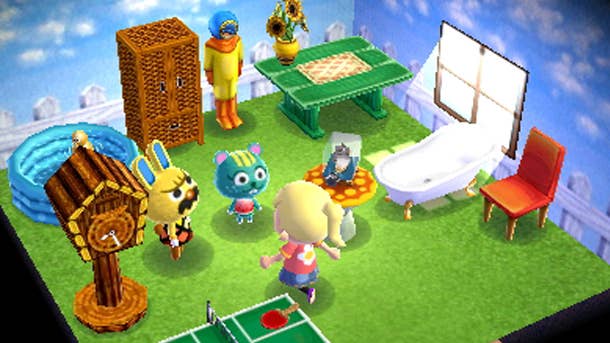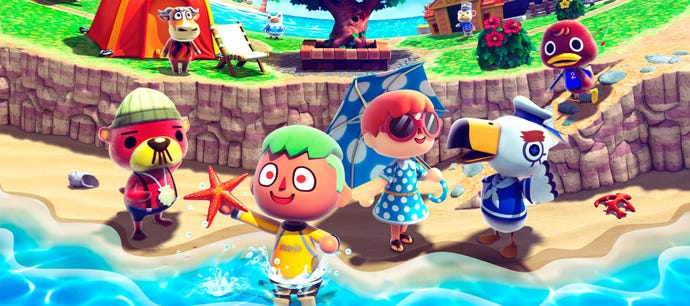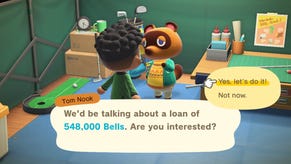Shorting the Turnips Market
Eurogamer's Chris Donlan investigates Animal Crossing's strange spin on Wall Street.
This article first appeared on USgamer, a partner publication of VG247. Some content, such as this article, has been migrated to VG247 for posterity after USgamer's closure - but it has not been edited or further vetted by the VG247 team.
What would Michael Lewis make of Animal Crossing? What would the man who's chronicled the inhuman, almost science fiction-tinged, excesses of Wall Street culture in books like Liar's Poker and The Big Short have to say of the Bell economy and the tyranny of Tom Nook?
One thing he'd at least recognize, I suspect, is the trajectory that's taken hold in the Gamer Network offices: we started off with property, and now we're dabbling in the stock market. Or, rather, we're dabbling in the Animal Crossing equivalent of the stock market, which is turnip prices. And some of us are taking things way beyond mere dabbling.
Turnips have always been part of Animal Crossing, but I've never really paid them too much attention before. Every Sunday, Joan the boar turns up in town to sell: you can buy as many turnips as you can afford, and then you get a week in which to shift them on again. The magical ingredient, however, is that the price of turnips is extremely volatile. One day, they could be worth well over 100 bells each, the next -- this happened to me yesterday -- they were down to a lousy 58. 58 bells! Who are they kidding? (And who's this they, anyway?)
As with the stock market, it's a bit like playing chicken with your own finances, but there's an added time pressure, too. Turnips rot: they don't last forever, so you've got to get rid of them while you've still got something to actually get rid of. Towards the end of each week, the life of a turnip speculator can become rather twitchy. You've gambled, and so far it's yet to pay off. At which point do you cut your losses? And if you cut your losses, will you be tempted back again?

From a pure game design angle, the turnip market is a quiet stroke of genius, a buried mechanic that players will seek out when they're tired of all the more obvious stuff on offer. More importantly, it offers a brilliant incentive to log in every day -- twice a day, in fact, since Reese down at the Re-Tail shop offers updates on turnip prices in the morning and the afternoon.
It also pushes you outwards a little: since everyone in the Gamer Network offices is now heavily leveraged in the turnip market -- I'm almost certainly using that term incorrectly -- and, since everyone's turnip vacillations are unique to them, every morning and every afternoon we now find ourselves getting together and comparing prices. Once there's a clear winner, the negotiations begin. Sure, you can sell your rotting turnips in my village, but in return...?
This is social gaming, Nintendo style. No need for trade screens or complex systems of interaction: just provide the basic impetus and players will merge the real world and the game world without a second thought. The dynamics -- acquisition, failure, profit and loss -- all reside within the real world anyway, so it's hardly too much of a push for the imagination.
On top of that, though, the turnip markets also reveal Nintendo at its most mischievous and satirical. Animal Crossing's designers have taken a real-world system that's so complex in its various moving parts that the relationships between its inputs and outputs can seem pretty much random to outsiders, and it's replaced the innards with something that does genuinely appear to be entirely random -- and it still works. There are no market forces prodding the turnip prices up and down, but you don't need those forces in order to become hooked as a speculator -- you just need the promise of a reward, and the thrill of risk.
It's that mysterious Nintendo perspective again: a system designed by a group of adults who are somehow able to tap into memories of what the adult world looks like to a child -- a parody of the real-world that moves to the unarguable beat of kid logic.
And what happens next? There's a great Philip K. Dick story about a cold war being fought between two planets, in which one of the warring parties manufactures a variant of Monopoly in which you're ultimately meant to lose. They then send this game to their rivals as an act of secret aggression -- a way of ensuring the future collapse of an economy by changing the way that a generation of children think about investment.
Nintendo obviously doesn't have the same ambitions here -- turnips are ultimately an amusing way to view the stock market rather than an all-out attack on capitalism -- but I still love the idea that, one day, some economics major is going to get their first entry-level job on the trading floor and suddenly realise Oh, I've been here before. This whole thing is just like the turnips market.





.jpg?width=291&height=164&fit=crop&quality=80&format=jpg&auto=webp)

.jpg?width=291&height=164&fit=crop&quality=80&format=jpg&auto=webp)
.jpg?width=291&height=164&fit=crop&quality=80&format=jpg&auto=webp)